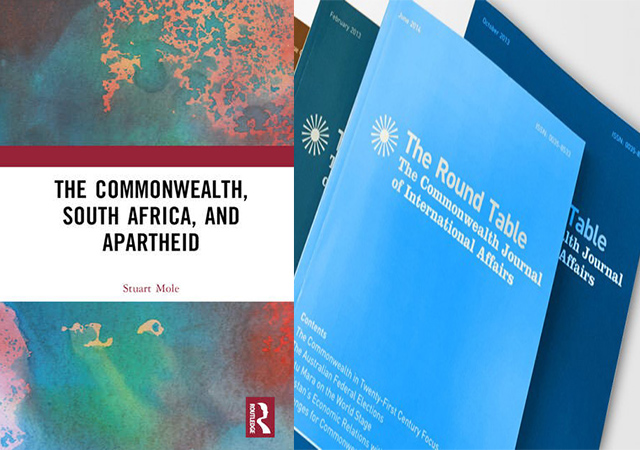
[This is an excerpt from an article in The Round Table: The Commonwealth Journal of International Affairs.]
‘How distinctive and significant was the Commonwealth’s contribution to the international campaign against apartheid’? Did the imperial history of the institution, and the ongoing importance of the UK within it, act as a brake on campaigning or provide the opportunity for ‘special influence’? (p. 1). These are the questions that animate this new book from Stuart Mole, which represents a major scholarly undertaking.
The book traces the evolution of the Commonwealth’s approach to apartheid through eleven chronological chapters, from ‘The Decline of the Imperial Commonwealth’ in the 1940s (Chapter 2) to ‘The “Freedom Elections” and Apartheid’s End’ in the 1990s (Chapter 12). The chapters move between South African politics, the UK, and the Commonwealth’s institutions and major players, in what is a sometimes awkward dance, but one that is ultimately productive, providing new insights by bringing these together. The detailed and nuanced arguments are careful to dissect many of the myths of Commonwealth apartheid activism. For example, Chapter 4 explores South Africa’s exit from the Commonwealth after Sharpeville, demonstrating that this departure – held up retrospectively as evidence of early anti-apartheid commitment – was far from planned. South Africa was ‘not expelled, nor consciously excluded’ (p. 66). Instead, the chapter charts how more or less by accident, the Commonwealth ‘ended up on the right side of history’ as ‘the first international organisation to drive South Africa from membership of a global body’. (pp. 66–7).
The book demonstrates how Commonwealth action on apartheid became increasingly coordinated, ambitious, and effective over time, although Mole is careful to chart the ambiguities and dissension along the way. Strikingly, the chapters illustrate that, for supporters of apartheid, the Commonwealth moved from what Dubow (Citation2017, p. 294) dubbed ‘a relatively protected space’ in the international realm to a deeply uncomfortable one, in the course of a few years from 1960. By 1966, Harold Wilson was complaining that ‘Britain was being treated “like a bloody colony”’ in Commonwealth meetings, due to its stance on Southern Africa (p. 84). Mole shows that it was not a coincidence that the Commonwealth’s increasing impact in anti-apartheid action came after the formation of the Secretariat in 1965, with the first Secretary-General Arnold Smith making important contributions alongside the more celebrated impact of Shridath Ramphal.
Book launch and discussion – The Commonwealth and apartheid: Myth and reality
Power and decision making in South Africa
Whilst the book provides a nuanced discussion, in which the Commonwealth position can be seen as less ambiguously anti-apartheid than some more celebratory narratives might suggest, under the archival microscope, the UK government, under various leaders, comes across as every bit the ‘baddie’ of popular accounts from a Commonwealth perspective! They often act to try to limit the freedom and potential of the Secretariat, undermine anti-apartheid action and frustrate progressive international voices for racial justice, as well as dismissing many newer members of the Commonwealth.
The book draws primarily on archival research, alongside memoirs and, to a lesser extent, oral history interviews. The documents of political leaders dominate over analysis of popular culture or grass-roots activism. This is an account of high politics, told primarily through the Commonwealth Secretariat Archives, and those of South Africa, the UK, Canada and Australia. As Hodder (Citation2017) notes, archival ‘abundance’ can be as much of a challenge as scarcity, and the challenge of doing such transnational research is both this abundance and the geographical dispersal of the records. It would have been wonderful to triangulate some of the other key Commonwealth government’s perspectives, for example the Frontline States, influential Caribbean states, and India with those of Australia, Canada and the UK.
Mole is both an insider and an outsider in this book. He worked at the very top of the Commonwealth Secretariat, in the Director General’s Office, for 16 years from 1984 to 2000, giving him almost unparalleled insights into the decision-making in the institution in the crucial years in which apartheid crumbled and was replaced (as well as perhaps privileged access to some archival materials not yet open to the public). Yet, unlike some insider accounts which feel self-congratulatory and lacking context, the years of PhD research that brought this book together have allowed Mole to look also from the outside in. This unique positioning is a key strength of the book and allows it to move beyond the common narratives which either make the Commonwealth a heroic and central voice in the struggle against apartheid, or, equally problematically, dismiss its contribution altogether (p. 240). By placing what is often at the peripheries of many academic accounts of anti-apartheid action at the centre, but offering an evidenced, critical perspective, Mole provides a nuanced and important contribution to literature about the Commonwealth, about the international fight against apartheid, and, as a happy by-product, of the complex and contradictory relationship between the Commonwealth and the UK government.
Dr Ruth Craggs is a Reader in Political and Historical Geography at King’s College London.
The Commonwealth, South Africa and apartheid: Race, conflict and reconciliation by Stuart Mole, London, Routledge, 2023.



